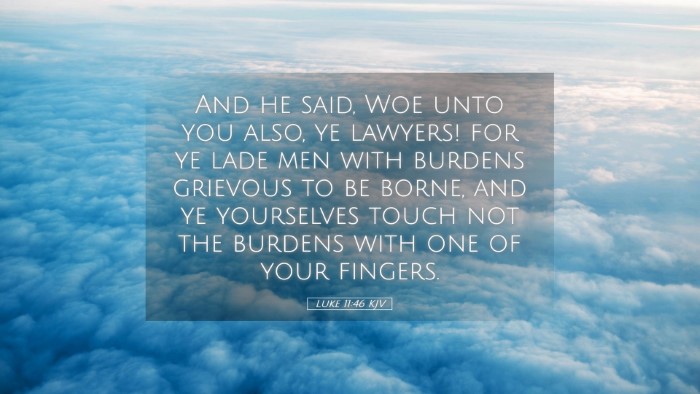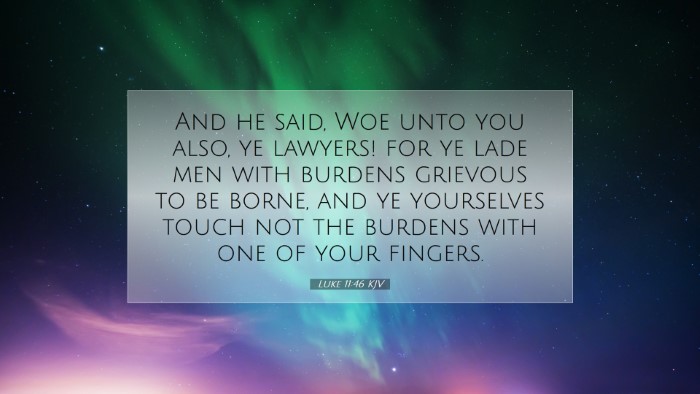Commentary on Luke 11:46
Verse Reference: Luke 11:46 - "And he said, Woe unto you also, ye lawyers! for ye lade men with burdens grievous to be borne, and ye yourselves touch not the burdens with one of your fingers."
Introduction
This verse is a part of Jesus' rebuke directed towards the religious leaders of His time, specifically the lawyers or scribes. It underscores the serious nature of their hypocrisy and the burdensome weight of the laws they imposed on the people. This commentary synthesizes insights from various public domain resources, including Matthew Henry, Albert Barnes, and Adam Clarke, to explore the implications of this verse.
The Context of Luke 11:46
The backdrop of this rebuke is set in Jesus' ongoing ministry, where He faced opposition from the religious authorities. In preceding verses, Jesus provides an admonition about the Pharisees and their external observance of the law without true righteousness. Here, He extends His criticism to the lawyers, who were experts in the law but failed in their moral and spiritual obligations.
Understanding the Burden
Matthew Henry notes that the term "burden" here symbolizes the heavy regulations and traditions that the attorneys of the law placed upon the people. These burdens were often not rooted in the heart of God's law but were derived from human traditions that weighed heavily on the conscience of the common people.
Albert Barnes elaborates that these lawyers had a responsibility to teach and guide the people towards understanding God's law. Instead, they added layers of restrictions that made compliance difficult, creating a spiritual atmosphere of fear rather than one of grace.
Woe to You, Lawyers!
The usage of the term "woe" indicates a grave warning and lament from Jesus. It expresses disapproval of the lawyer's actions and their implications on their standing before God. They were guilty of leading others astray while failing to assist in bearing the burdens they themselves imposed.
The Hypocrisy of the Lawyers
Adam Clarke points out that the condemnation of the lawyers is primarily based on their hypocrisy. They created a system of laws that they themselves did not follow, demonstrating a disconnect between their teachings and their actions. This profound inconsistency serves as a warning to religious leaders throughout history about the importance of integrity in ministry.
Theological Implications
The verse highlights significant theological themes about grace, law, and Christ's role as the ultimate bearer of burdens. Jesus offers a contrasting view to the burdensome nature of the law, inviting those who are weary to come to Him for rest (Matthew 11:28-30). This invitation redefines the relationship between God and humanity.
Faith vs. Works
The struggle between faith and works is a central theme in this passage. The lawyers emphasized external compliance to the law while neglecting the inner spirituality that God required. Henry points out that true obedience comes from a heart transformed by God's grace rather than through mere legalistic observance.
Application for Present-Day Believers
Modern-day readers must question whether they place heavy burdens on others in the name of righteousness while failing to address their own spiritual shortcomings. This critique challenges both individual believers and corporate church leadership to strive for authenticity and to extend grace rather than adding unnecessary weight to others' spiritual journeys.
Conclusion
Luke 11:46 serves as a sobering reminder of the need for humility, genuine faith, and the compassionate care of others. As we engage with this text, let us commit to a representation of the gospel that lightens burdens instead of adding to them. Through the studies of Henry, Barnes, and Clarke, we are encouraged to reflect on the integrity of our spiritual lives and to seek to follow Christ's example, who came to fulfill the law and offer rest to the weary.


